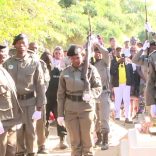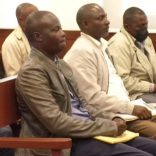Mozambique: Murder victim in Matola was senior police officer - AIM report
Hidden debts trial: 31 August 2021 – Lusa reports

File photo: Lusa
- Son of ex-president Guebuza says court should hear current president
Armando Ndambi, son of former Mozambican President Guebuza, on Tuesday said in court that his father’s successor, Filipe Nyusi, is the right person to talk about the coastal protection project at the origin of the hidden debts.
“The person who was part of the joint command was the minister of defence” at the time, Nyusi, so it is to him that the question has to be asked, he said.
Ndambi was responding to a question about his involvement in the project during his second day of hearing in the hidden debts trial, which is being held in Maputo in tents set up in the space of the maximum-security jail, due to the logistics involved.
Asked by the Mozambique Bar Association (OAM), an assistant in the case, about the impact of the debts for the country, he considered the question political.
“I would like to say that this matter [of the damage caused to the country] is already a political matter, otherwise we will enter into another very long debate. The issue here is the hidden debts,” he said.
Isálcio Mahanjane, the defendant’s lawyer, protested against the question, considering that it suggested guilt on the part of his constituent, a complaint promptly answered by the judge of the cause, Efigénio Baptista.
The reference to the current Mozambican President, Filipe Nyusi, in the trial of the so-called ‘hidden debts’ case had already been made by the two defendants heard last week, before Armando Ndambi Guebuza.
Cipriano Mutota, former director of Studies and Projects at the State Information and Security Service (SISE), the Mozambican secret service, and Teófilo Nhangumele, an independent consultant who participated in the conception of the EEZ protection project, said in court that Nyusi agreed to the implementation of that initiative in his capacity as defence minister.
The hearing of Armando Ndambi Guebuza was again marked on Tuesday by crispness, with the accused interrupting several times the judge of the case and the lawyers of OAM to rebel against questions that he considered repetitive, claiming that they were asked on Monday, the first day of his questioning in the present trial.
The judge asked Ndambi several times to answer questions without being rude, telling him that to any “father who is born a son”, what he wants is to be proud of him.
As on Monday, the former president is still in the room where the hearing is taking place, watching his son being questioned from the front row of chairs reserved for the audience.
Ndambi again denied on Tuesday having received $33 million (€27.9 million) pointed out by the Public Ministry as a bribe amount to influence his father to accept that the Abu Dhabi-based shipyard company Privinvest signed contracts for the supply of coastal protection equipment and services.
The Mozambican Public Prosecutor’s Office believes that the contracts with Privinvest were a scheme engineered to divert resources used to pay bribes to several people, including figures linked to former PM Guebuza.
The eldest son of the former head of state confirmed having travelled several times to Abu Dhabi, confirmed meetings with the company’s owner, Iskandar Safa, and with the company’s negotiator Jean Boustani, but stated that his trips were never on behalf of the Mozambican state, but in his capacity as a businessman.
He also confirmed having received bank transfers from Jean Boustani in accounts domiciled in South Africa, assuming that such transactions were made as part of business partnerships.
The public prosecutor’s office accused the 19 hidden debt defendants of having joined together in a “gang” to fleece the Mozambican state and leave the country in a difficult economic situation.
“Whoever forms a gang to steal from the State is not at the service of the State. The defendants acted together, putting their private interests above the interests of the state,” said Ana Sheila, the Public Prosecutor who read the indictment.
The conduct of the 19 defendants, she said, siphoned off $2.7 billion (€2.28 billion) from the Mozambican state – an amount the Public Prosecutor’s Office says was more than the $2.2 million so far known in the case – raised from international banks through guarantees provided by the government.
According to the Mozambican Public Prosecutor’s Office, the various crimes that the defendants committed include association to commit crimes, influence peddling, passive corruption for the illicit act, money laundering, embezzlement, abuse of office or function and document forgery.
The ‘hidden debts’ were contracted between 2013 and 2014 from the British subsidiaries of investment banks Credit Suisse and VTB by Mozambican state-owned companies Proindicus, Ematum and MAM.
The loans were secretly endorsed by the Frelimo government, led by the president at the time, Armando Guebuza, without the knowledge of parliament or the Administrative Court.
- Hidden debt trial extended until November
The Maputo City Judicial Court announced on Tuesday the extension of the hidden debts trial until November and not October, as had initially been indicated, justifying the measure with the complexity of the case.
Efigénio Baptista, the judge in charge of the case, said he agreed to the lawyer of one of the defendants to request Jean Boustani, the negotiator of the Abu Dhabi-based shipyard company Privinvest accused of paying bribes fed with the money from the debts.
“This trial, we have until November,” Efigénio Baptista noted.
“We all want to get to Lebanon [Jean Boustani’s land], we want to hear Jean Boustani,” Baptista said.
The magistrate advanced that Boustani will be heard as a declarant through videoconference, noting that a letter rogatory will be sent by the Attorney General’s Office to the Lebanese judicial authorities, requesting the hearing of the Privinvest negotiator.
“We have two months to do that,” Baptista said, adding that if it was impossible to hear Jean Boustani, the trial would continue without his testimony. The evidence collected throughout the trial would be valid.
The Public Prosecutor’s Office and the Mozambican Bar Association (OAM), which was admitted to the trial as an assistant to the prosecution, also approved the taking of Jean Boustani’s statement.
The Mozambican Public Prosecutor accuses Jean Boustani of having paid bribes to people close to former President Armando Guebuza to enable contracts for the supply of coastal protection equipment and services by Privinvest triggering the contraction of hidden debts.
The trial started on the 23rd, and the initial plan was to last 45 days, a period now changed, with the extension announced today until November.
In allegations read nine days ago, the Public Prosecutor accused the 19 defendants of the “hidden debts” of having associated themselves in a “gang” to rob the Mozambican state and leave the country “in a difficult economic situation.
The 19 defendants, he said, siphoned off US$2.7 billion (€2.28 billion) from the Mozambican state – a figure the prosecutors said was higher than the US$2.2 billion so far in the case – raised from international banks via guarantees provided by the government.
The loans were secretly guaranteed by the Frelimo government, led by the president at the time, Armando Guebuza, without the knowledge of the parliament or the Administrative Court.












Leave a Reply
Be the First to Comment!
You must be logged in to post a comment.
You must be logged in to post a comment.